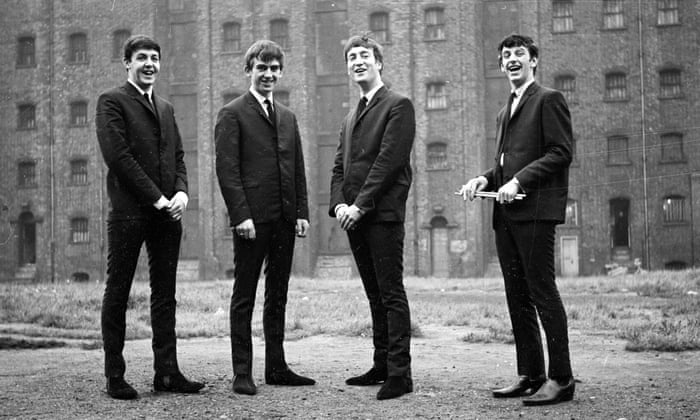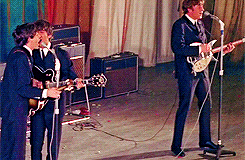All you need is love… and screaming: what the Beatles really meant
Eva Wiseman
Sunday 25 September 2016
The new documentary about the Beatles brings to life some very old memories

Fab four: (from left) Paul, George, John and Ringo in Liverpool in 1962. Photograph: Copyright Apple Corps
When George Martin’s son recently remixed the Beatles’ live recordings, he removed the screams. Hearing snatches of the new songs makes me feel uncomfortable, as if… as if the music has been caught just coming out of the shower, too naked, too raw. And also it seems to miss the point. If you want the pure music there are the studio albums – if you want the live experience, you need the fans.
My mum’s friend phoned her after watching The Beatles: Eight Days a Week. The oddest thing, she said: she’d seen Val. At the ABC Cinema in Ardwick in 1963, my mum and Val were the only ones not screaming. It was two days before John F Kennedy was assassinated and one of the coldest winters on record, but that always seems to be the case, especially in Manchester, and especially looking back.
My mum was 12, and too young to fancy even Paul, and she remembers looking over at Val’s older sister, a beatnik, usually poised and cool as anything, and seeing her getting up on to her seat and dancing, her hands reaching towards the stage where “She Loves You” was being drowned out by the sound of girls. In 1966 the Beatles stopped touring because of just this.
“Those who flock round the Beatles,” wrote Paul Johnson in the New Statesman the following February, “who scream themselves into hysteria, whose vacant faces flicker over the TV screen, are the least fortunate of their generation, the dull, the idle, the failures”.
It seems laughable now, to dismiss that power, that roar. Those screams weren’t just screams of passion, they were screams of protest. Every girl in that crowd in Ardwick, apart from my mum and her friend Val, was releasing something big and frightening, and it scared the policemen, standing with their hands on their hips, an expression of sour terror on their faces.
So my mum and Val looked at each other, then joined in. The way she tells it, their first scream was just to be part of it, screaming to feel what all the other girls were feeling, that mad chaos. The second scream was different.
How did it feel, I texted my mum. “To release all that pent up suburban repression?” she replied. Yeah, how did it feel? The little dots on my phone were flashing, she was writing. Then she wasn’t. Then she was. Dot dot dot. Eventually, “Fabulous,” she said.

Though the girls became a unit, a crowd, when the camera sweeps away from the stage you can make eye contact with each one. You can see each fan moved for a slightly different reason, each scream a slightly different tone. For all the words written and films made about the Beatles, for all the Radio 4 documentaries, for all the politics (on which the film is fascinating), the fans are for me by far the most interesting and awe-inspiring aspect of the myth. They moved as a mass, but peeled off from the crowd their little lives are revealed to be bigger than the stories suggest.
After being introduced to the worlds outside their record players, Val and my mum snuck off to clubs, where Val won a prize for lip-synching to Sandie Shaw. The trick was, she took her shoes off before she got on stage. A couple of years after the concert in Ardwick, the two of them spent a summer pretending to be French. They’d learned how to fancy boys by then, and hung around Manchester flirting in Jacques Prévert quotes and writing poetry.
“Islands all are islands,” my mum texts me, remembering Val’s poem 50 years later. “Separate and unique, trying to communicate, not knowing what we seek.” It was awkward speaking in a French accent, she says, when one of the boys told her the Six Day War had begun.
When Val started dying earlier this year, my mum made her a mixtape. It had the Beatles, of course, and she got the train up to Glossop to sit with her and listen and talk. They talked about that concert, their fear and that noise. The music was a way of accessing other things. They were out in the world in a room swollen with feelings, and her sister was up on the chair and their heroes were on the stage, and they made the decision to become part of something bigger, the decision to join in.
Fifty years later by her bed, the songs reminded them of all the small moments of their shared history. She died in March, and reappeared yesterday in Eight Days a Week, a happy ghost, screaming.

No hay comentarios:
Publicar un comentario